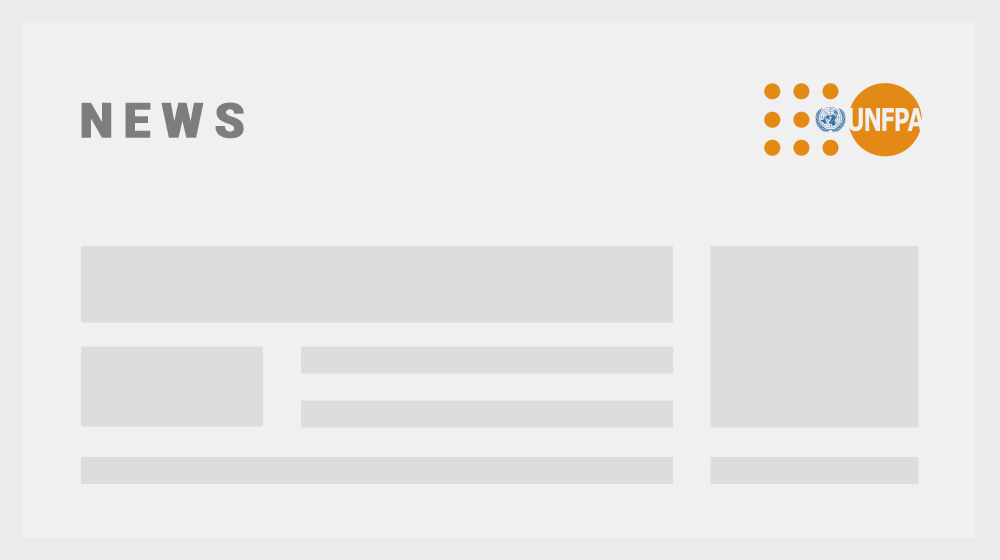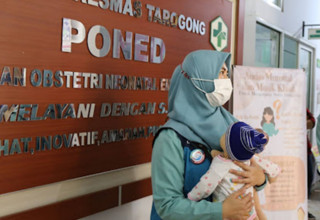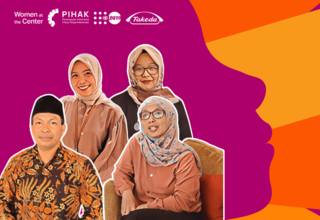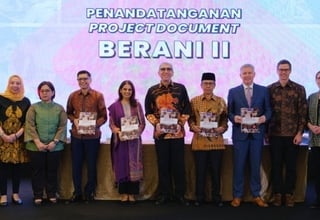Ruth* was in her 30s when her husband first started physically and sexually assaulting her. As the domestic abuse continued over the years, the mother-of-two tried but failed to get help.

The village of Benyom in Papua's Jayapura district is home to around 350 people. © UNFPA Indonesia/Vania Desiyanti
“I reported this violence to the police. But the police said to me ‘mama just go home, mama solve this with the family and try to reconcile with your husband’,” recalls Ruth, who lives in a village of around 350 people in Papua’s Jayapura district and is now 52 years old.
“The police told me that there was a law protecting women and children but they advised me to think about it because if I took legal action, my husband would go to jail. If my husband was jailed, I wouldn’t have food. At the end I relented and went home.”
Indonesia passed a Law on Domestic Violence in 2004 (UU 23/2004), which states “victims, most of whom are female, should receive protection from the state and/or community to avoid domestic violence or any threats of violence”.
But it wasn’t until 2011 that Ruth completely understood her rights to protection when a Papuan-based non-governmental agency LP3A, the Foundation for Studies and Empowerment of Women and Children, visited her village of Benyom. The NGO hosted a workshop via Pujaprema – a crisis centre and network for women and children, facilitated by the provincial office of women’s empowerment – and explained the regulation and their rights clearly. Men and boys were also provided information, which Ruth says helped change her husband’s behavior.
The workshop was part of a Violence Free Villages (VFV) component of the UN Trust Fund to End Violence Against Women project in Papua. Led by UNFPA, together with UNICEF and and UN Women, this initiative was designed to improve data collection and develop district-level action plans against violence, while significantly enhancing the quality and accessibility of support services for women and girls at the grassroots level. The project initially started with the creation of three VFV, later reaching more than 1,000 women and children violence survivors through the creation of a community watch system and an early detection, reporting and referral mechanism.

Socialization workshops were held in the village of Benyom in Papua's Jayapura district to raise awareness of violence against women and children. © UNFPA Indonesia/Vania Desiyanti
“Socialization workshops were held to raise awareness of violence against women and children and other issues including the national regulation, traditional practices and linkages between STIs HIV/AIDS and VAWC,” explains Siti Akmianti, the Director of LP3A, of the indicators put in place to implement a VFV.
“Village stakeholders developed action plans outlining their commitment to prevent and handle these cases and a village-based mechanism to handle cases and for early detection were established.
By taking a “community approach to raise awareness”, Slamet Soebroto, a member and former chairman of Pujaprema, says they were able to encourage more people to come forward and report cases of domestic violence.
“We built an emotional bond within the villages among the people, which is very important,” says Slamet, who added that the Governor of Papua formally issued decree No.27/2013 on “Violence-Free Villages for Prevention” on 30 Dec, 2013.
“In the past it was rare for people to report any cases of domestic violence so we didn’t have any data. But as people’s awareness grew, more women came forward voluntarily.”
In Jayapura, lifetime prevalence of emotional, economic, physical or sexual intimate partner violence perpetration is 60 percent, according to findings from the “UN Multi-Country Study (MCS) on Men and Violence”. The study also found that 23 percent of men reported ever perpetrating rape against a non-partner and 7 percent reported involvement in gang rape. More than 60 percent of men who reported perpetrating sexual violence were under the age of 19 the first time they did so. Frequent quarrelling with a partner, depression and alcohol abuse and witnessing the abuse of their mother in childhood were some of the risk factors attributed to IPV perpetration.
“Patriarchal culture is common, where men feel more powerful than women,” explained Slamet. “In Papua, some men feel that through the dowry they are able to purchase the women. And some women in Papua are dependent on men and they are afraid to be left as they think they won’t be able to eat.”
Learning about her rights and the law helped empower Ruth to speak up for change. She is now a member of her village’s community watch system acting as one of the representatives to report signs of violence.
There are now five VFV in the district of Jayapura, two more were created in 2012, with Siti and Slamet both hopeful that this project can be replicated in other areas of Papua.
Beyond the VFV Initiative

The Violence Free Villages component was part of the UN Trust Fund to End Violence Against Women project in Papua, which was run in five villages including Benyom in Papua's Jayapura district. © UNFPA Indonesia/Vania Desiyanti
In a bid to change social norms that increase the risk of violence against women and girls (VAWG) in Asia and the Pacific, a regional joint project between UNDP, UNFPA, UN Women and UNV was developed to help promote and implement effective violence prevention programmes and policies.
The Partners for Prevention (P4P) project in Indonesia builds on the VFV initiative and seeks to engage adolescent girls and boys aged 13-15 and 16-18, along with their parents, religious leaders and other influential community members in participatory group education sessions to achieve this goal to end VAWG.
Papua was chosen as the research and intervention site to roll out the P4P project, with a village from the Jayaura district selected as the test spot. With the research phase already complete, the second phase (2014-2017) focuses on interventions to prevent VAWG, capacity development, the promotion of volunteerism and policy advocacy at the national level in a number of sites where P4P research has been undertaken.
“The ongoing work of VFV committees together with the community engagement component of the P4P intervention from this project will create an enabling and supportive environment for adolescents to adopt gender equitable, respectful, and healthy attitudes and norms particularly those related to interpersonal relationships,” says Risya Ariyani Kori, UNFPA Indonesia’s National Programme Officer for Gender.
Promoting gender equity, equality and the empowerment of women is a core mandate of UNFPA. Under UNFPA Indonesia’s 8th Country Programme (2011-2015), emphasis was placed on advancing the agenda for broader male involvement to achieve gender equality and to address violence against women and girls. The agency has been working with government and civil society partners to strengthen male involvement initiatives.
*Name has been changed for privacy.




